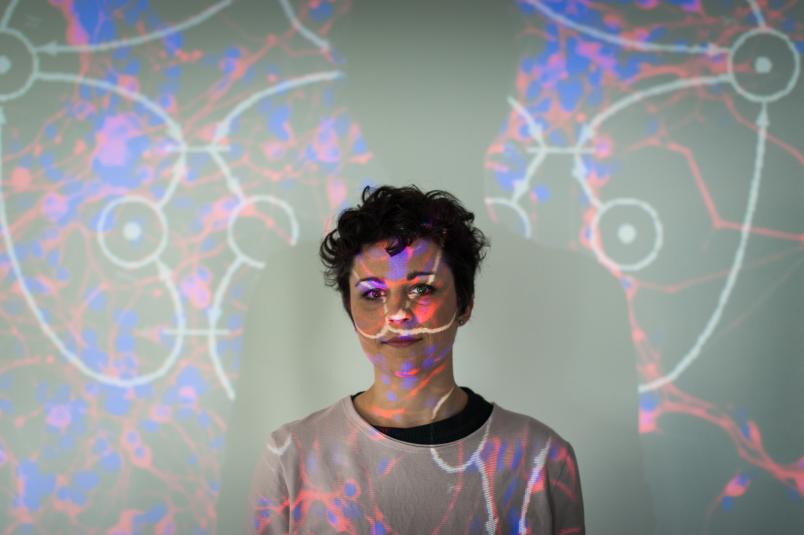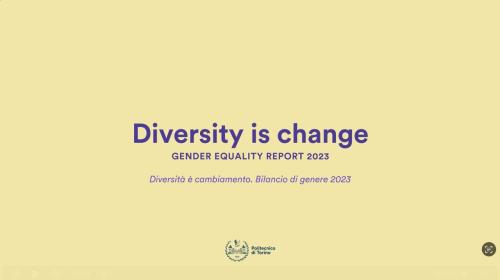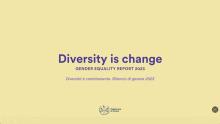
For more than twenty years the polytechnic community has been questioning itself on the broad theme of Equal Opportunity, which includes attention to the gender balance of the student population and staff: from the Women: Engineering Profession project in the early 2000s to the current WeAreHERe project.
It collects and interprets gender data at the University level the Gender Equality Report with an analysis dedicated to faculty, technical-administrative staff and the student community. If the Gender Balance is triennial, an updated subset of particularly significant indicators is available annually in the Gender Data Monitoring section
The Gender Equality Plan (GEP) and the Gender Equality Action Plan (GEAP) are correlated and interconnected to the Gender Balance Sheet and are fundamental in the pursuit of the University's gender policies.
The Gender Observatory monitors and coordinates gender policies at the University level. By reinterpreting national and international good practices and by participating in the CRUI gender table with national guidelines, the Gender Observatory is an advisory body that, appointed by Rectoral Decree, pursues gender objectives in the new strategic plan and, confirming the adherence to and implementation of the principles of the European Charter for Researchers, puts in place initiatives aimed at monitoring and governing equal opportunities in relation to the various aspects in which diversity is declined, starting from gender.

The analysis of disaggregated data according to the gender dimension is carried out comprehensively every three years, with the publication of the Gender Equality Report of the University.
The first gender report, covering the three-year period 2016-2019, was published in 2020 with the focus Diversity is Excellence and the full version in Italian is available for download here. A concise extract is available for easier reference, in both Italian and English.
On 28 November 2023, the University's second Gender Equality Report, entitled Diversity is Change, was presented to the University and approved by the Academic Senate at its meeting on 15/11.

Within the framework of the University's initiatives from a gender perspective, in line with the 2022-2024 Action Plan and the actions envisaged by the Gender Equality Plan - GEP, a number of significant actions have been carried out with a view to raising our community's awareness of the inclusive use of language, also through the integration of the gender dimension in research and education.
Specifically, with a view to inclusive language, two sub-actions were announced at the Academic Senate meeting of 18 July 2023:
- Practical Guide for Inclusive Communication prepared, in collaboration with the CIRSDe of the University of Turin, in order to disseminate in the polytechnic community some essential guidelines for the correct use of inclusive language and take a further step towards achieving gender equity within our institution. The aim of the publication, of which an extended and a more agile version is available for download, is to support the PTAB and the teaching and research staff in the drafting of communications and proceedings with inclusive language, for clear and concise communication that at the same time goes beyond socio-cultural barriers by adopting non-discriminatory language.An extended and agile b/w print version is also available.
- Updating the Athenaeum address book in an inclusive language perspective through a specific procedure that offers each person in the community the opportunity to choose the gender declination of his or her role within MYPOLI. It is understood that, if the person does not intend to make any changes to his or her public profile, the gender shown in the address book will remain the current default one, i.e. with declination linked to his or her gender.

Gender Equality Diversity Inclusion and Wellbeing (GEDIW) Plan 25-27 approved by the Collegiate Bodies in late January and a natural extension to the wellness theme of the data-driven participatory planning experience gained with the GEP (Gender Equality Plan) which integrated the gender policies outlined in the strategic plan of the Politecnico di Torino 2018-2024, PoliTo4Impact, configuring itself as an accompaniment to redefine some addresses starting from the context analysis in a gender perspective carried out in the Gender Equality Report 2020 of Politecnico di Torino, Diversity is Excellence. In this context, the GEP has been structured to highlight the presence of the characteristics required by the European Commission for participation in all the Horizon Europe calls for research and innovation.
The GEDIW Plan, like the Gender Equality Action Plan (GEAP) in its time, is the tool through which the University's gender, inclusion, diversity and well-being policies become operational. It has a three-year duration and is accompanied, in addition to ongoing monitoring of actions, by periodic monitoring through specific indicators (KPIs) identified for each action. The GEDIW Plan identifies 5 areas of intervention, each of which is accompanied by a description of the reference context (current situation; recent developments; objectives for the three-year period 2024-27) and a recap of the Actions, 17 total, contained within it.
Each of the Actions is accompanied by a brief textual description and deepened into its Sub-Actions (2 to 4 Sub-Actions for each Action, for a total of 51 Sub-Actions in the entire GEDIW Plan), shown in a table in which the political and organizational responsibilities for their implementation are assigned. You can view the details of the GEDIW PLAN 2025-27 Activity Sheets here.
Politecnico di Torino considers equal opportunity and inclusion to be founding values of the community and is committed to promoting them in every aspect of the University's life, including scientific and/or popular events organized and/or sponsored by the University.
For this reason, it incorporates and extends the guidelines available to date at the national level in order to ensure gender balance and enhance diversity in the academic community. These Guidelines for Gender Equality and Diversity in Events are addressed to the structures and individuals involved in the organization and promotion of the above-mentioned scientific and/or popular events, in order to direct them to respect gender balance and diversity.
Gender balance means the indicative representation for each gender between 40% and 60% - in any case, the least represented gender should not be less than 30%. By diversity, we mean the inclusion in interventions and/or event organization of people with different cultural, professional, and backgrounds, whether identity, social, geographic, ethnic, or other.

Politecnico di Torino, a longstanding advocate for gender equality, is actively committed to enhancing female talent in STEM disciplines. Through targeted initiatives — including financial incentives and opportunities for professional growth — the University promotes the active participation and advancement of women in research, education, and technological innovation.
Below are the calls, awards, and initiatives promoted by the University, reflecting Politecnico’s ongoing commitment to building an academic environment that is increasingly fair, inclusive, and welcoming to diversity.
Amazon Women in Innovation Bursary
For the 2024/2025 academic year, the Politecnico di Torino, in partnership with Amazon Italia Services S.r.l., is once again offering the “Amazon Women in Innovation Bursary,” aimed at first-year female students enrolled in Computer Engineering programs. The selected student will receive financial support along with a mentorship pathway with an Amazon manager.
Zonta Women in STEM Award
The Zonta Women in STEM Award is open to women aged 18 to 35 who have made significant contributions through innovative research in STEM fields. Zonta International awards 16 international prizes of $10,000 each, promoting diversity and inclusion in the sector.
Empowering Equity Academy – EIF e EIB Institute
Now entering its fourth edition, the Empowering Equity Academy is a European initiative in which the Politecnico di Torino is participating for the second consecutive year. The project supports young women in STEM and sustainability by encouraging them to explore career opportunities in fields such as private equity and impact investing. Central to the initiative is a free course promoted by the European Investment Bank (EIB), offering insights into European private equity markets though online workshops, mentorship opportunities, and a closing networking event in Luxembourg with industry professionals.
In a pilot phase during the previous academic year, the 2024 call was reserved for participants in the Politecnico’s WeAreHERe program. Among the five applicants, students Lucrezia Ferrara and Letizia Salvatelli — the only candidates selected from Italian universities — described the experience as “a valuable opportunity for training and international exchange […] allowing us to engage with leading professionals and test ourselves in the simulation of a real investment process, with a focus on equity and representation.”
For the 2025 edition, the call is open to all students enrolled in a Master’s Degree Program in Engineering at the Politecnico di Torino.
Ingenio al Femminile Thesis Award
Now in its fifth edition, the Ingenio al Femminile Thesis Award, promoted by the National Council of Engineers (CNI) in collaboration with Cesop HR Consulting Company, aims to highlight the talents and professional achievements of women in engineering.
The award is reserved for recent female engineering graduates across five disciplinary fields. In the previous edition, the Giulia Cecchettin Award for Biomedical Engineering was granted to Francesca Bucchieri from the Politecnico di Torino for her thesis on an innovative cell culture system designed for nerve tissue transplantation and the testing of therapies as alternatives to animal models.
The 2025 edition invites reflection on the impact of artificial intelligence (AI) in areas such as environmental sustainability, biotechnology, information systems, and large commodity infrastructure networks. It is open to female graduates who have obtained their degree between 1 April 2024 and 31 March 2025, with a final grade of no less than 105/110.
The deadline for submitting applications has been extended to 12.30 p.m. on Friday 18 July 2025.







